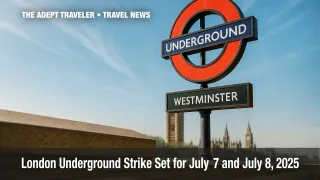London Underground Strike Set for July 8-9: What Tube Riders Need to Know

A fresh London Underground strike is penciled in for July 8-9 2025, threatening a near-total shutdown of Tube services just as the summer tourist season peaks. Train-driver union ASLEF and multi-grade union RMT have signaled a 48-hour walkout over pensions, staffing levels, and a stalled 2025 pay deal. Transport for London (TfL) has not yet issued its statutory strike notice, so the dates remain provisional; officials must confirm or cancel the action at least seven days ahead. Travelers and daily commuters should monitor TfL updates and have a Plan B ready.
Key Points
- 48-hour strike slated for July 8-9; confirmation due July 1.
- RMT and ASLEF demand pension guarantees and job-security clauses.
- Limited or no Tube service likely across all 11 lines.
- Why it matters: peak-season visitors face gridlock on roads and buses.
- Heathrow, Gatwick, and Eurostar links could see severe crowding.
London Underground Strike Snapshot How It Works
The London Underground moves roughly four million passengers a day across a 249-mile network of deep-level and sub-surface lines. During a full walkout, TfL cannot legally draft non-qualified drivers or signallers, so most lines close outright. A skeleton service-typically 25 percent of normal frequency-may operate on limited sections where management grades can staff control rooms, but connections between central hubs usually collapse. Oyster and contactless fares are automatically capped when closed stations prevent completion of journeys, yet commuters often queue for post-strike refunds. Overground, Elizabeth line, and buses may run, but they fill quickly and traffic congestion skyrockets.
London Underground Strike Background Why It Matters
Industrial relations on the Tube have grown tense since pandemic-era bailouts saddled TfL with cost-cutting targets. In 2022 and 2023, RMT members staged six multi-day stoppages over proposed pension reforms and up to 600 job cuts. A temporary truce in early 2024 unraveled after TfL sought savings from the £14 billion ($17 billion) pension fund. Although RMT claimed a "pension victory" in March 2025 when TfL paused formal reform talks, drivers argue the threat remains. Parallel negotiations on the 2025 pay round have stalled, with management refusing to discuss a shorter workweek or travel-perk extensions. Ballots in May returned strike mandates of 90 percent (RMT) and 98 percent (ASLEF), paving the way for July's coordinated action.
London Underground Strike Latest Developments
The strike notice sits in a legally grey window: unions have announced dates, but TfL has not posted its required customer notice. Under UK law, workplace stoppages must be flagged at least 14 days before they begin or be mutually waived.
Unions Set 48-Hour Walkout
RMT's executive committee voted on June 18 to call "all functions" out from 0001 July 8 until 2359 July 9. ASLEF's Tube drivers will down tools in the same window, a tactic aimed at guaranteeing a full network shutdown rather than the patchy closures seen in earlier disputes. Union leaders say members are "exhausted by broken promises" on pensions and fear compulsory redundancies once TfL's current government support package expires in September.
Pensions and Job Security Remain Flashpoints
Although TfL signaled in March that it had "no immediate plans" to alter the final-salary pension, internal documents obtained by RMT show finance teams still modeling a career-average scheme. Staff representatives also point to management's refusal to rule out driverless-train trials, viewing them as a long-term redundancy threat. The unions demand a binding no-layoff clause and a multi-year pay deal linked to retail-price inflation.
TfL Contingency and Rider Options
TfL says it will "work to keep London moving" but admits service will be "severely limited" if the strike proceeds. Past walkouts cut Central and Northern line frequencies to one train per 15-20 minutes on short inner-city stretches, with the rest of the network silent. Bus capacity rises by roughly 300 vehicles, yet routes near King's Cross, Waterloo, and Victoria often gridlock by 7 a.m. Travelers heading to Heathrow or Gatwick should pre-book National Express coaches or, if budgets allow, mini-cab transfers. Eurostar passengers should allow extra time to clear St Pancras checks and consider overnight accommodation if arriving late on July 8. TfL pledges to confirm alternative-route maps and station opening lists no later than July 4.
Analysis
For U.S. vacationers, a mid-week Tube shutdown can jeopardize prepaid tours, theatre tickets, and tight flight connections. First-time visitors should stay within walking distance of key sights or near National Rail links such as Waterloo or Paddington. Oyster and contactless caps reset daily, so unused Tube credit will not vanish; however, refund queues at Heathrow can stretch an hour. Hotels outside Zone 1 may cost less, yet taxi fares surge when the Underground closes, erasing savings. If you must travel, aim for departure before 7 a.m. and after 7 p.m. to dodge the worst crush. Visitors with mobility issues should note that rail-replacement buses rarely replicate step-free access. For broader tactics, read our guide to navigating UK rail strikes (internal link).
Final Thoughts
The July 8-9 London Underground strike is not set in stone, but history suggests last-minute deals are rare once unions coordinate action. Confirm your itinerary by July 1 when TfL must publish final service details. Hold refundable rates where possible, download offline maps, and consider a contactless bank card as a quick top-up alternative if Oyster kiosks close early. With a solid backup plan, you can still enjoy London-even when the trains stay in the depot.
